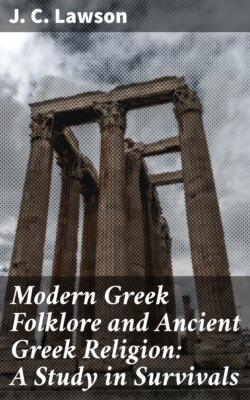Читать книгу Modern Greek Folklore and Ancient Greek Religion: A Study in Survivals - J. C. Lawson - Страница 13
На сайте Литреса книга снята с продажи.
§ 4. Pan.
ОглавлениеTable of Contents
A story, again from the same collection[137], runs in brief as follows:—Once upon a time a priest had a good son who tended goats. One day ‘Panos’ gave him a kid with a skin of gold. He at once offered it as a burnt-offering to God, and in answer an angel promised him whatsoever he should ask. He chose a magic pipe which should make all hearers dance. So no enemy could come near to touch him. The king however sent for him, and the goatherd, after making the envoys dance more than once, voluntarily let himself be taken. The king then threw him into prison, but he had his flute still with him, and when he played even houses and rocks danced, and fell and crushed all save him and his. ‘The whole business,’ concludes the story, ‘was arranged by Panos to cleanse the world somewhat of evil men.’
Here the pastoral scene and the gift of the magic pipe (not by Panos himself, it is true, but indirectly thanks to him) suggest a genuine remembrance of Pan. It was from him that ‘bonus Daphnis’ learnt the art of music. The form which the name has assumed is the chief difficulty. The modern nominative, if formed in the same way as in other words of the same declension, would naturally be Panas (Πάνας), and the unusual termination arouses some suspicion that the narrator of the story had heard of Pan from some literary source and, as often happens in such cases, had got the name a little wrong. But if the tale be a piece of genuine tradition, the conclusion of it is remarkable. The moral purpose ascribed to the deity seems to indicate a loftier conception of him than that which is commonly found in ancient art and literature. But the popular tradition embodied in the legend is not therefore necessarily at fault; indeed it may be more true to the conception of Pan which prevailed among the common-folk in old days than were the portraits drawn and handed down by the more educated of their contemporaries. The patron-god of Arcadian shepherd-life would naturally have seemed a rude being to the cultured Athenians of the fifth century, who but for his miraculous intervention in the battle of Marathon would never have honoured him with a temple. But among his original worshippers it may well be that, besides presiding over the increase of their flocks, as did Demeter over the increase of their fields, he was deemed to resemble her also in the possession of more exalted attributes, so that there was cause indeed for lamentation over that strange message ‘Great Pan is dead[138].’
But perchance Pan is not dead yet, or if dead not forgotten. And as this solitary modern story, if it be genuine, testifies to a longlived remembrance of his better qualities, so in the demonology of the middle ages a sterner aspect of his ancient character still secured to him men’s awe. Theocritus[139] gave voice to a well-known superstition when he made the goat-herd say: ‘Nay, shepherd, it may not be; in the noontide we may not pipe; ’tis Pan that we fear’; for in his rage if roused from his midday slumber he was believed to strike the intruder with ‘panic’ terror: and it was this superstition which influenced the translators of the Septuagint when they rendered the phrase, which in our Bible version of the Psalms[140] appears as ‘the destruction that wasteth at noonday,’ by the words σύμπτωμα καὶ δαιμόνιον μεσημβρινόν. By the latter half of this phrase the memory of Pan was undoubtedly perpetuated; for in certain forms of prayer quoted by Leo Allatius[141] in the seventeenth century, among the perils from which divine deliverance is sought is mentioned more than once this ‘midday demon’; and a corresponding ‘daemon meridianus[142]’ found a place of equal dignity among the ghostly enemies of Roman Catholics.
Perhaps even yet in the pastoral uplands of Greece some traveller will hear news of Pan.
